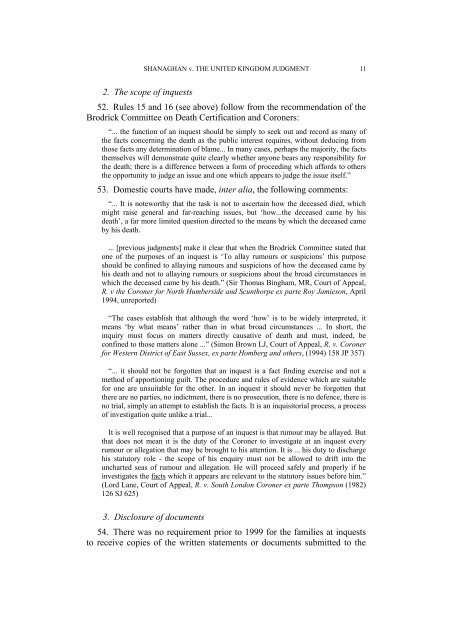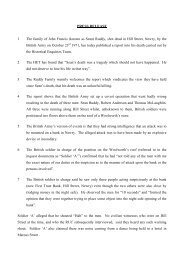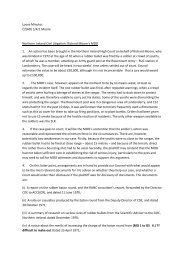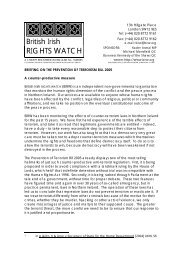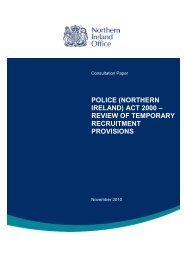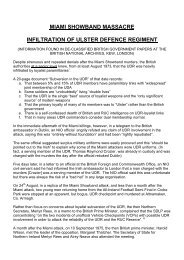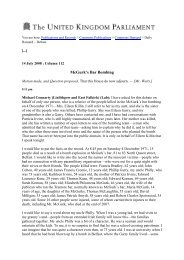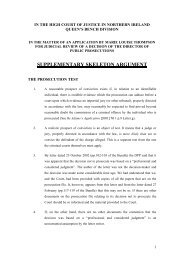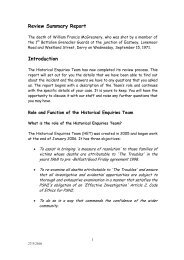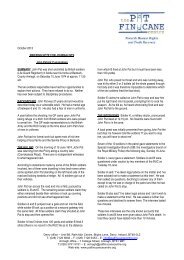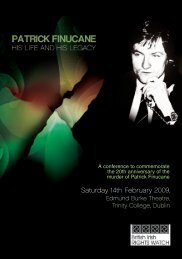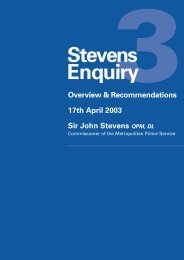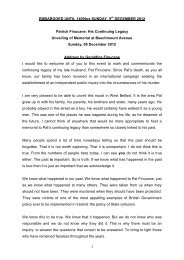Patrick Shanaghan v the United Kingdom - The Pat Finucane Centre
Patrick Shanaghan v the United Kingdom - The Pat Finucane Centre
Patrick Shanaghan v the United Kingdom - The Pat Finucane Centre
You also want an ePaper? Increase the reach of your titles
YUMPU automatically turns print PDFs into web optimized ePapers that Google loves.
SHANAGHAN v. THE UNITED KINGDOM JUDGMENT 11<br />
2. <strong>The</strong> scope of inquests<br />
52. Rules 15 and 16 (see above) follow from <strong>the</strong> recommendation of <strong>the</strong><br />
Brodrick Committee on Death Certification and Coroners:<br />
“... <strong>the</strong> function of an inquest should be simply to seek out and record as many of<br />
<strong>the</strong> facts concerning <strong>the</strong> death as <strong>the</strong> public interest requires, without deducing from<br />
those facts any determination of blame... In many cases, perhaps <strong>the</strong> majority, <strong>the</strong> facts<br />
<strong>the</strong>mselves will demonstrate quite clearly whe<strong>the</strong>r anyone bears any responsibility for<br />
<strong>the</strong> death; <strong>the</strong>re is a difference between a form of proceeding which affords to o<strong>the</strong>rs<br />
<strong>the</strong> opportunity to judge an issue and one which appears to judge <strong>the</strong> issue itself.”<br />
53. Domestic courts have made, inter alia, <strong>the</strong> following comments:<br />
“... It is noteworthy that <strong>the</strong> task is not to ascertain how <strong>the</strong> deceased died, which<br />
might raise general and far-reaching issues, but ‘how...<strong>the</strong> deceased came by his<br />
death’, a far more limited question directed to <strong>the</strong> means by which <strong>the</strong> deceased came<br />
by his death.<br />
... [previous judgments] make it clear that when <strong>the</strong> Brodrick Committee stated that<br />
one of <strong>the</strong> purposes of an inquest is ‘To allay rumours or suspicions’ this purpose<br />
should be confined to allaying rumours and suspicions of how <strong>the</strong> deceased came by<br />
his death and not to allaying rumours or suspicions about <strong>the</strong> broad circumstances in<br />
which <strong>the</strong> deceased came by his death.” (Sir Thomas Bingham, MR, Court of Appeal,<br />
R. v <strong>the</strong> Coroner for North Humberside and Scunthorpe ex parte Roy Jamieson, April<br />
1994, unreported)<br />
“<strong>The</strong> cases establish that although <strong>the</strong> word ‘how’ is to be widely interpreted, it<br />
means ‘by what means’ ra<strong>the</strong>r than in what broad circumstances ... In short, <strong>the</strong><br />
inquiry must focus on matters directly causative of death and must, indeed, be<br />
confined to those matters alone ...” (Simon Brown LJ, Court of Appeal, R. v. Coroner<br />
for Western District of East Sussex, ex parte Homberg and o<strong>the</strong>rs, (1994) 158 JP 357)<br />
“... it should not be forgotten that an inquest is a fact finding exercise and not a<br />
method of apportioning guilt. <strong>The</strong> procedure and rules of evidence which are suitable<br />
for one are unsuitable for <strong>the</strong> o<strong>the</strong>r. In an inquest it should never be forgotten that<br />
<strong>the</strong>re are no parties, no indictment, <strong>the</strong>re is no prosecution, <strong>the</strong>re is no defence, <strong>the</strong>re is<br />
no trial, simply an attempt to establish <strong>the</strong> facts. It is an inquisitorial process, a process<br />
of investigation quite unlike a trial...<br />
It is well recognised that a purpose of an inquest is that rumour may be allayed. But<br />
that does not mean it is <strong>the</strong> duty of <strong>the</strong> Coroner to investigate at an inquest every<br />
rumour or allegation that may be brought to his attention. It is ... his duty to discharge<br />
his statutory role - <strong>the</strong> scope of his enquiry must not be allowed to drift into <strong>the</strong><br />
uncharted seas of rumour and allegation. He will proceed safely and properly if he<br />
investigates <strong>the</strong> facts which it appears are relevant to <strong>the</strong> statutory issues before him.”<br />
(Lord Lane, Court of Appeal, R. v. South London Coroner ex parte Thompson (1982)<br />
126 SJ 625)<br />
3. Disclosure of documents<br />
54. <strong>The</strong>re was no requirement prior to 1999 for <strong>the</strong> families at inquests<br />
to receive copies of <strong>the</strong> written statements or documents submitted to <strong>the</strong>


